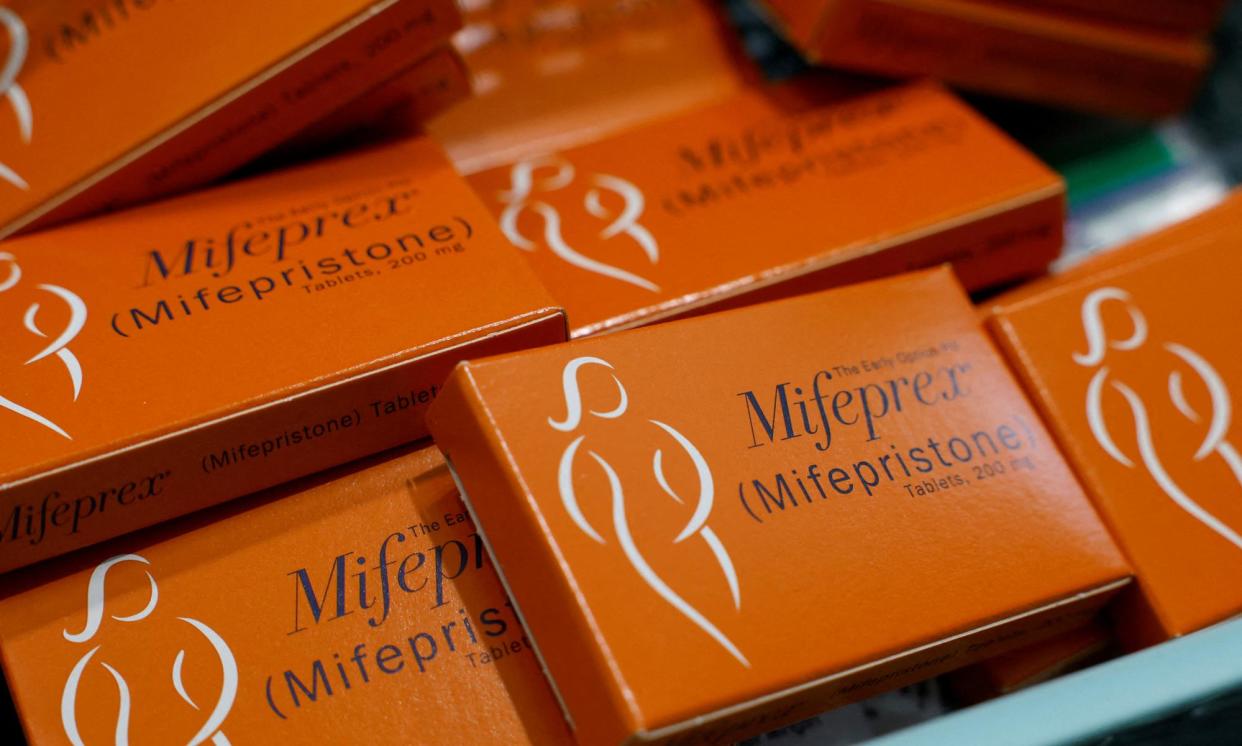US supreme court agrees to consider abortion pill access

The US supreme court on Wednesday agreed to hear oral arguments in a case that could determine the future of a pill used in most abortions in the US, in the first major abortion rights case to land at the country’s highest court since the justices overturned Roe v Wade and abolished the national right to the procedure in 2022.
A decision in the case will probably arrive in summer 2024, just months before the presidential election. The outcome of the case could affect not just access to the pill, which has been repeatedly deemed safe and effective, but the Federal Drug Administration’s authority to regulate all manner of medications.
Related: How mifepristone became a target of the US anti-abortion movement
The drug at the heart of the case is mifepristone, one of the two drugs typically used in medication abortions, which make up the majority of US abortions. Last year, an association of anti-abortion organizations and doctors, the Alliance for Hippocratic Medicine, filed a federal lawsuit arguing that the FDA had overstepped its authority when it approved mifepristone in 2000.
In April, a Texas federal judge appointed by former president Donald Trump issued a preliminary ruling to suspend the FDA’s approval of mifepristone and pull the medication off the market. The US court of appeals for the fifth circuit – one of the most conservative federal appeals courts in the US – ruled in August that, while it was too late to suspend the FDA’s approval, the agency should significantly restrict access to mifepristone. The Biden administration and Danco Laboratories, which manufactures mifepristone, then asked the supreme court to weigh in on the case.
The supreme court paused lower-court rulings while the case plays out, so mifepristone remains widely available in states that permit abortion. If the court allows the fifth circuit ruling to stand, it would roll back recent FDA efforts that refined the drug’s dosage and expanded access by allowing it to be prescribed later on in pregnancy and through telehealth.
On Wednesday, the supreme court agreed to hear the consolidated petitions from the Biden administration and Danco Laboratories, which asked the justices to focus on the legal attempts to roll back those later FDA efforts. Those petitions also asked the justices to consider whether the challengers have the legal right, or standing, to bring the case in the first place.
“You can’t just bring random lawsuits in court. You actually have to have been harmed by something,” said Greer Donley, an associate law professor at the University of Pittsburgh Law School. “That’s really what standing analysis is all about, to try to figure out if if the people who bring the lawsuit actually have a stake in the case.” Numerous legal experts have questioned whether the challengers in this case have properly demonstrated that they have been harmed by mifepristone’s continued legality.
The supreme court also denied a petition from the Alliance for Hippocratic Medicine that asked the justices to explicitly consider the FDA’s 2000 approval of mifepristone. That move suggests that the supreme court is unlikely to pull mifepristone off the market entirely.
In Donley’s view, the outcome of this case will probably signal whether the supreme court, which is controlled 6-3 by conservatives, wants to be involved in the post-Roe war over abortion rights. If the justices decide to focus on the standing issues in the case, they could sidestep having to rule on the substance of the case entirely.
“I could see the more moderates on the supreme court thinking: ‘we don’t want to touch this,’” Donley said. “It might make the supreme court look like less of an activist court if it were to dismiss this case on the basis of really legitimate standing problems.”
Any ruling by the court would affect all 50 states, including those that have protected abortion rights. (In recent months, officials in states such as Washington and California have announced that they have begun to stockpile mifepristone.)
A ruling could also imperil the FDA’s regulatory power writ large and pose an existential threat to pharmaceutical companies. If courts can rewrite the FDA’s approval of abortion pills, any kind of drug – including, for example, drugs used to protect against HIV or to provide gender-affirming care – could end up in conservative jurists’ crosshairs.
The ruling from the federal appeals court, Danco Laboratories warned in its briefs to the supreme court, “destabilizes the pharmaceutical and biotechnology industries by questioning when scientific studies – accepted by FDA – are sufficient”. More than 100 studies, conducted across 26 countries, have concluded that mifepristone is safe, a New York Times review found.
If deprived of access to mifepristone, several abortion clinics have said that they would keep providing medication abortions using only misoprostol, the other drug typically used in medication abortions. Although misoprostol-only abortions are still overwhelmingly safe, they can have more side-effects and are slightly less effective than the two-drug protocol.
Ultimately, regardless of how the supreme court rules, its decision will not curtail the thriving underground networks that routinely supply mifepristone to women looking to end their pregnancies, including in the 16 states with near-total abortion bans. In fact, a move to ban mifepristone is likely to cause a sharp rise in demand for the drug through those networks.
In the wake of Roe’s fall, a vast web of abortion rights supporters and opportunistic merchants have sprung up to ship abortion pills to Americans. Inducing your own abortion is not illegal in most US states, even in states that have banned in-clinic abortions, and medical experts widely agree that it can be safe to use pills to “self-manage” an abortion early in pregnancy.


